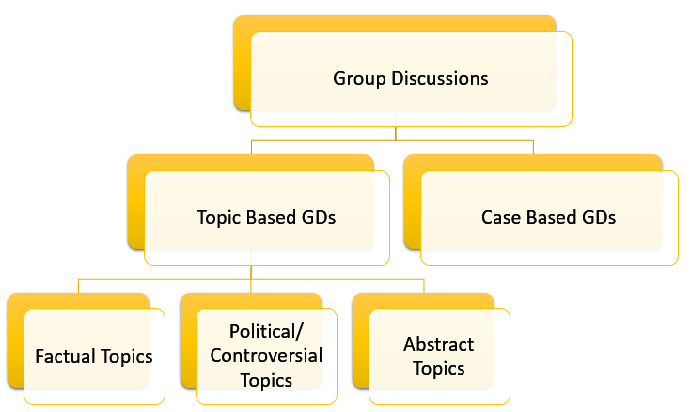In our previous posts about group discussions, we talked all about what these group discussions actually are: the process as well as the important dos and don’ts.
In this article, we will take a look at the various categories under which GD topics fall. We will also suggest the best approach for tackling topics from each of these categories.

First and foremost, let us understand the main purpose of conducting a GD. It is held to ascetain whether a candidate has certain personality traits that an organization wishes to see in its members. Some important personality traits that are examined while you are appearing for a GD are:
- Ability to take initiatives
- Knowledge base
- Communication skills
- Team spirit
- Goal achievement
- Conflict Resolution
In case-based GD topics, the group is given a short case, that states a problem that requires a solution. The point to be taken care of here is that the entire group should work as a team to find the solution. During the course of discussion- one should identify the cause of the problem, analyze the situation, accordingly examine various ways of solving that problem and conclude with the best way out.
Topic-based GD topics can be further categorized into three categories.
1. Factual Topics
Such topics require familiarity with day to day issues, trends over the years, facts and figures etc. These test a candidate on their ability to analyze and gather information. They also test your lateral thinking abilities. A thorough understanding of current affairs combined with good interpersonal skills is what is required to get through.
Factual topics can either be generic (for example- ‘honesty is the best policy’, ‘guesswork roots from knowledge’, ‘Indian education system endorses rote learning’ etc.) Now, for such topics, one can quote data/ facts/ incidents from previous years. One should try looking at the topic from various viewpoints and substantiate their viewpoint with concrete arguments.
The second category of factual topics is specific. These topics may refer to a very specific incident that happened recently (a terrorist attack) or a policy introduced by the government (say, some PDS scheme). These topics may be from various fields like economics, current affairs, technology, education, sports etc.
One must explain the issue/ incident/ policy and go on to examine the cause and the effects. Try not to take a stand right in the beginning, one must be open to others’ views.
2. Political/ Controversial Topics
These could have been easily put under the category of ‘specific factual topics’, but it is in such discussions that people tend to make a lot of mistakes. Hence, these demand a special focus.
First and foremost thing is to never begin the discussion by taking a pre-meditated concrete stand on the issue. The idea should be to gradually build towards your conclusion by quoting relevant examples/ incidents/ facts/ statistics. This way you will be able to contribute more substantially to the discussion. Take care that you never lose your temper or mock/shoot down other people’s opinions.
If you stick to your stand right from the start, you might get agitated if others don’t agree and that’s the last thing you want in a GD. Remember that it’s a discussion and not a debate. Try to convince others but at the same time be open to being convinced by someone else’s arguments. One should speak cogently, whenever they do.
3. Abstract Topics
These topics are similar to a googly thrown to a batsman. One can hit a six or might even get stumped. Abstract topics can be as random as: ‘black’, ‘girl in yellow boots’, ‘Friday’, ‘5’ or ‘I like ice-creams’.
We should understand that such topics tend to test our ability of lateral thinking and creativity.
One can try linking these abstract ideas to concrete real life situations/ things. For instance, if the topic was say, ‘Apple’ one can try connecting it to the brand ‘APPLE’ instead of simply talking about it as a fruit. Proverbs related to the word apple can be discussed, for example: ‘apple of my eye’, ‘an apple a day keeps the doctor away’ etc. Then it can be mentioned, that most of the proverbs/ usages of the word ‘apple’ have positive connotations. The discussion can further be steered in the direction of examining why ‘apple’ has such a positive usages. This can involve the discussion of the health benefits of the fruit, or the fact that it is associated with the greatest scientist (Newton and the apple etc.).
When an abstract topic is given for discussion, the scope is immense. Also, one should try to develop on what others’ in the group say.
Some points to be kept in mind throughout are:
- Make sure you are heard but also be a good listener
- Acknowledge that everyone has something valuable to say. Show them respect even if you don’t agree with them. Never force your opinion on someone
- Speak up clearly and precisely. Articulate your points in a way that is easy for all to comprehend
- Focus on all members of the group. Avoid one-to-one dialogues
- Avoid showing off your point-of-view, don’t be aggressive or rude and avoid cutting someone in between their dialogue. Raise your hand before speaking
Lastly, be confident in what you say!
Hope this helps you tackle your GDs better.
All the best.

The most comprehensive online preparation portal for MBA, Banking and Government exams. Explore a range of mock tests and study material at www.oliveboard.in
